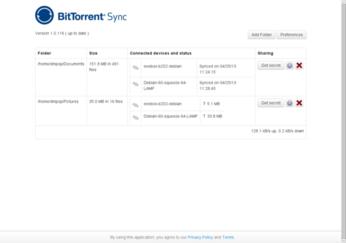BitTorrent Sync: Painless File Syncing without the Cloud

Productivity Sauce
Cloud-based file syncing services are a dime a dozen nowadays. Most of them store copies of your data on remote servers and charge for storage space. This approach has two major drawbacks: you have to entrust your data to a third-party service, and the more storage you need, the more you have to pay. The recently released BitTorrent Sync tool offers an alternative solution that solves these problems. Instead of relying on a central server for storing files and syncing them between multiple machines, BitTorrent Sync uses a peer-to-peer protocol to keep files in sync across multiple machines. This is a brilliant solution, indeed. You don't need to run a dedicated synchronization server, there is no storage limit, and all your data stays on your machines. Better still, BitTorrent Sync encrypts all the traffic to keep your data safe.
Deploying BitTorrent on Linux is as easy as pie. Grab the appropriate version of the tool from the project's website, unpack the downloaded archive, and move the btsync executable binary to the directory of your choice. Run then BitTorrent Sync using the ./btsync command. Point then your browser to 127.0.0.1:8888/gui to access BitTorrent Sync's web interface. Here, you can add the folders you want to keep in sync. When adding a folder, you have to create a secret, a randomly generated 21-byte key. This secret is used to link folders between multiple machines.
While you can use the ./btsync command to run BitTorrent Sync with default settings, this is not always a good idea, as this leaves the web interface unprotected. The solution is to create a configuration file and point BitTorrent Sync to it. To view a sample configuration, run the ./btsync --dump-samle-config command. You can use the sample as a starting point for your own configuration file. Here is what my configuration file looks like:
{
"check_for_updates" : true,
"download_limit" : 0,
"upload_limit" : 0,
"webui" :
{
"listen" : "0.0.0.0:8888",
"login" : "username",
"password" : "password"
}
}To start BitTorrent Sync with a custom configuration file, use the ./btsync --config /path/to/btsync.conf command (replace /path/to/btsync.conf with the actual path to the configuration file).
comments powered by DisqusSubscribe to our Linux Newsletters
Find Linux and Open Source Jobs
Subscribe to our ADMIN Newsletters
Support Our Work
Linux Magazine content is made possible with support from readers like you. Please consider contributing when you’ve found an article to be beneficial.

News
-
New Linux Botnet Discovered
The SSHStalker botnet uses IRC C2 to control systems via legacy Linux kernel exploits.
-
The Next Linux Kernel Turns 7.0
Linus Torvalds has announced that after Linux kernel 6.19, we'll finally reach the 7.0 iteration stage.
-
Linux From Scratch Drops SysVinit Support
LFS will no longer support SysVinit.
-
LibreOffice 26.2 Now Available
With new features, improvements, and bug fixes, LibreOffice 26.2 delivers a modern, polished office suite without compromise.
-
Linux Kernel Project Releases Project Continuity Document
What happens to Linux when there's no Linus? It's a question many of us have asked over the years, and it seems it's also on the minds of the Linux kernel project.
-
Mecha Systems Introduces Linux Handheld
Mecha Systems has revealed its Mecha Comet, a new handheld computer powered by – you guessed it – Linux.
-
MX Linux 25.1 Features Dual Init System ISO
The latest release of MX Linux caters to lovers of two different init systems and even offers instructions on how to transition.
-
Photoshop on Linux?
A developer has patched Wine so that it'll run specific versions of Photoshop that depend on Adobe Creative Cloud.
-
Linux Mint 22.3 Now Available with New Tools
Linux Mint 22.3 has been released with a pair of new tools for system admins and some pretty cool new features.
-
New Linux Malware Targets Cloud-Based Linux Installations
VoidLink, a new Linux malware, should be of real concern because of its stealth and customization.

